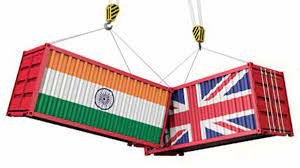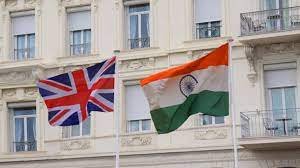
Amidst the intricate tapestry of global commerce, where the tapestries of economic diplomacy weave the destinies of nations, the ongoing negotiations between the European Free Trade Association (EFTA) and India, coupled with the diplomatic dance between India and the United Kingdom (UK) for a Free Trade Agreement (FTA), find themselves ensnared in a pivotal moment – a stalemate casting an ominous shadow over the prospects of fortified economic bonds.
The Prolonged Odyssey of EFTA-India Talks
The recent visit of Swiss and Norway Trade Ministers to India on 13 December has sparked immense optimism about reaching Trade and Economic Partnership Agreement (TEPA) with four Nordic Countries of the European Free Trade Association – Iceland, Norway, Switzerland and Liechtenstein. According to The Hindu’s Report, the visiting Trade Ministers are “optimistic” on trade agreement ahead of India’s General Elections. Though the talks have seen some progress yet few issues related to IP Rights and copyrights prevail before fruition.
The odyssey of negotiations between EFTA and India has traversed a staggering 15-year expanse, encapsulating a relentless endeavor to forge a resilient trade alliance. Recent developments hint at a modicum of optimism, resonating with echoes of proximity to a pact. Yet, as the temporal pendulum swings towards potential resolutions, the elaborate ballet of diplomatic negotiations reveals the multifaceted challenges lurking beneath the veneer.
Worker Mobility and Intra-Company Transfers
A Crucial Nexus: At the epicenter of the EFTA-India deliberations lies the ambition for streamlined intra-company transfers, echoing the global trend of adept professionals traversing geographical boundaries. The ramifications transcend mere economic deliberations, delving into the core of labor mobility and its repercussions on employment in both regions. As these negotiations unfold, the lingering query remains: Can the yearnings for augmented worker mobility act as a catalyst for a breakthrough, or shall they metamorphose into an impediment on the road to a consensus?
India-UK FTA
Navigating the Complexity of Round 14: Simultaneously, on another geopolitical front, India and the United Kingdom find themselves entangled in the intricacies of the 14th round of FTA negotiations. The deliberations have reached a precarious juncture, with unresolved issues such as Rules of Origin (ROO) looming ominously. The labyrinthine nature of these talks and the convolutions surrounding pivotal points like ROO are pivotal in unraveling the present status of the India-UK FTA.
Rules of Origin
The Tangled Web of Trade Dynamics: The intricate minuet around Rules of Origin constitutes a critical chapter in the India-UK FTA negotiations. The determination of the provenance of goods and their entitlement to preferential trade benefits is not a mere technicality but a conclusive factor in shaping the contours of the agreement. As negotiators grapple with the intricacies of ROO, the stakes soar, and the outcome holds the key to unlocking the full potential of the proposed FTA.
Comparative Analysis
Unveiling Similarities and Differences: The protracted nature of both sets of negotiations forms a common thread weaving through the narrative. The EFTA-India talks, spanning 15 years, epitomize the endurance requisite for reaching a mutual accord. Concurrently, India-UK FTA negotiations, progressing through 14 rounds, underscore the dedication of both nations despite the hurdles encountered along the path. The dimension of time assumes a critical role, raising questions about the viability of negotiations in the face of prolonged deliberations.
Worker Mobility and Intra-Company Transfers

A Comparative Lens: While the EFTA-India talks specifically aim to facilitate seamless intra-company transfers for workers, the India-UK FTA negotiations also hold implications for labor mobility. However, the emphasis in the latter leans more towards resolving issues like ROO and achieving a balanced trade relationship. Contrasting these aspects provides insights into the nuanced approaches adopted by the negotiating parties.
Critical Juncture and Stalemate Concerns: Both sets of negotiations have reached critical junctures, each laden with its unique set of challenges. The EFTA-India talks exude optimism about clinching a pact before the 2024 elections, injecting a sense of urgency into the deliberations. Conversely, the India-UK FTA talks, marked by persistent disparities, escalate concerns about an impending stalemate. The resolution of pending issues transforms into not merely a matter of diplomatic maneuvering but a critical imperative to avert a deadlock.
Challenges and Resolutions
Navigating the Diplomatic Maze in EFTA-India Talks: Balancing Economic Priorities and Political Considerations The aspiration for a closer pact with India aligns with EFTA’s economic interests, but the challenges lie in harmonizing economic priorities, political considerations, and the diverse needs of member countries. As negotiations unfold, the diplomatic tightrope becomes increasingly challenging to traverse.
India-UK FTA Negotiations
Addressing the Complexity of Rules of Origin: The India-UK talks grapple with challenges related to Rules of Origin, a critical facet determining the origin of goods and their eligibility for preferential trade benefits. The resolution of these issues assumes pivotal significance for the success of the agreement, and grappling with the complexity of ROO demands a delicate equilibrium between economic considerations and diplomatic pragmatism.
Future Implications and Expectations EFTA-India Agreement
Navigating Towards a Breakthrough: The optimism voiced by Switzerland’s Ambassador to India regarding the EFTA deal being inked before the 2024 elections sets the stage for a breakthrough. A successful agreement could pave the way for fortified trade relations, establishing a precedent for future collaborations. However, the path towards this breakthrough is laden with challenges that necessitate judicious navigation.
India-UK FTA Outlook
The Crucial Phase of Negotiations: As leaders from both India and the UK endeavor to resolve lingering issues, the talks step into a critical phase. Successful navigation through these challenges will be instrumental in establishing a landmark FTA between two substantial economies. The outcome of these negotiations bears not only economic significance but also shapes the narrative of future trade relations on the global stage.
The Crossroads of Bilateral Relations

In the labyrinth of international trade negotiations, the EFTA Agreement talks with India and the India-UK FTA negotiations stand at a crossroads. The complexities, challenges, and critical junctures underscore the gravity of these diplomatic endeavors. As negotiators grapple with intricate details, the outcomes will not only shape the bilateral trade relations between the involved parties but also set precedents for future international trade agreements.











Comments 1